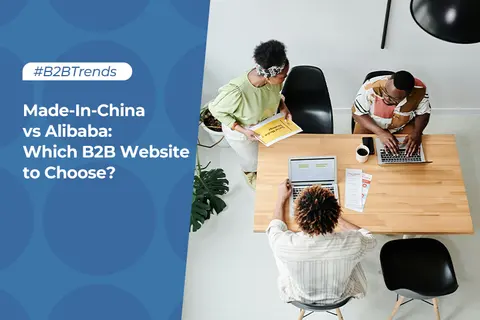Made-In-China vs Alibaba: Which B2B Website to Choose?

Table of Contents
- Introduction
- Made-In-China: A Brief Introduction
- Alibaba: A Brief Introduction
- Made-In-China vs Alibaba: The Similarities
- Made-In-China vs Alibaba: The Differences
- Made-In-China vs Alibaba: How to Choose?
- Is Made-in-China.com Legit?
- Made-in-China Reviews: A Closer Look
- Alibaba Reviews: How is It?
- Conclusion
Introduction:
In the realm of business-to-business (B2B) e-commerce, Made-In-China and Alibaba stand as titans, connecting buyers with suppliers on a global scale. Both platforms offer a plethora of products and services, catering to the diverse needs of businesses worldwide. But when it comes to deciding between these two giants, which one reigns supreme? Let's delve into the intricacies of Made-In-China and Alibaba to determine which B2B website is better suited for your business needs.
Made-In-China: A Brief Introduction
Established in 1998, Made-In-China serves as a platform operated by Focus Technology Co., Ltd. This platform acts as a conduit, linking buyers from across the globe with Chinese suppliers. With a vast array of suppliers spanning 27 industries, Made-In-China facilitates transactions ranging from agricultural products to machinery.
Unlike Alibaba, Made-In-China does not directly sell products but rather provides a platform for buyers to connect with suppliers. Despite its narrower focus on industrial and construction goods, Made-In-China remains a formidable player in the B2B e-commerce landscape.
Alibaba: A Brief Introduction
Founded in 1999 by Jack Ma and his associates, Alibaba Group has evolved into a multifaceted ecosystem empowering businesses to sell products and services globally. With around 10 million sellers hailing from various Asian countries, Alibaba offers a comprehensive range of products across multiple categories.
Under the Alibaba umbrella, platforms like AliExpress, Taobao, and TMall cater to different segments of the market, further solidifying its dominance in the e-commerce space. Alibaba.com serves as the primary business-to-business (B2B) platform, facilitating transactions between global buyers and suppliers. It offers a comprehensive range of products across various industries, providing businesses with access to a vast network of suppliers and manufacturers. From consumer goods to technology and electronics, Alibaba boasts an extensive product portfolio, making it a one-stop destination for B2B transactions.
Made-In-China vs Alibaba: The Similarities
Despite their differences, Made-In-China and Alibaba share several core similarities:
- Both platforms serve as online trading hubs, connecting suppliers—primarily from China—with buyers worldwide.
- They offer diverse product categories and facilitate transactions through international payment systems like PayPal.
- Both prioritize buyer protection, providing safeguards such as escrow payment services and dispute resolution mechanisms.
Made-In-China vs Alibaba: The Differences
While Made-In-China and Alibaba share similarities, they diverge in key areas:
- History: Alibaba has a longer history and a broader global reach compared to Made-In-China.
- Product Range: Alibaba offers a wider range of products across various categories, while Made-In-China focuses primarily on industrial and construction goods.
- Supplier Base: While both platforms feature Chinese suppliers, Alibaba also includes suppliers from other Asian countries.
- Payment: Made-In-China charges a fee for its escrow payment service, whereas Alibaba offers Trade Assurance and Product Inspection Services free of charge.
Made-In-China vs Alibaba: How to Choose?
Choosing between Made-In-China and Alibaba hinges on various factors, including business objectives, industry focus, and preferences. Here's a deeper dive into considerations for selecting the optimal platform:
For Buyers: Made-In-China vs Alibaba
- Product Range: Alibaba boasts a vast selection of products across diverse categories, making it suitable for buyers seeking versatility and choice. However, if your business specializes in industrial or construction goods, Made-In-China may offer more targeted solutions.
- Reputation and Buyer Protection: Alibaba's robust buyer protection measures, including Trade Assurance and Product Inspection Services, instill confidence and mitigate risks. Conversely, Made-In-China's reputation may vary, necessitating thorough due diligence before engaging with suppliers.
- Customer Service: Alibaba's superior customer service ratings indicate a higher level of support and responsiveness, crucial for resolving disputes and addressing concerns promptly.
For Sellers: Made-In-China vs Alibaba
- Market Reach: Alibaba's extensive global reach and brand recognition attract a vast pool of buyers, offering unparalleled exposure and sales potential. Made-In-China, while influential within specific industries, may have a narrower audience.
- Product Focus: Made-In-China's specialization in industrial and construction goods appeals to sellers operating within these sectors, providing targeted marketing opportunities and niche positioning. Alibaba's broader product range caters to sellers across various industries, offering flexibility and scalability.
- Cost and Fees: While Made-In-China may charge fees for certain services like escrow payment, Alibaba's fee structure and pricing model may vary based on the chosen subscription plan and additional services required.
Is Made-in-China.com Legit?
Made-in-China.com is a legitimate platform. Made-in-China.com features products from over 27 industries, ranging from agriculture and food to metallurgy, mining, arts, and crafts. This extensive product range caters to the diverse needs of businesses worldwide, making it a go-to destination for sourcing various goods.
In terms of scale, Made-in-China.com continues to expand its reach, serving as a pivotal link between global buyers and Chinese suppliers. The platform's comprehensive offerings encompass over 3,800 product categories, reflecting its commitment to providing a broad spectrum of sourcing options for businesses.
Customer service remains a focal point for Made-in-China.com, the platform continually endeavors to enhance user experience and satisfaction. With a dedicated support team, Made-in-China.com strives to address customer inquiries and concerns promptly, ensuring a seamless trading experience for buyers and suppliers alike.
The platform's payment system, known as Secure Trading Service (STS), offers buyers added security and peace of mind during transactions. By holding funds in escrow until goods are received and approved, STS minimizes the risk of fraud and helps build trust between buyers and suppliers.
Made-in-China Reviews: A Closer Look
Made-in-China, a prominent B2B eCommerce platform based in China, offers a vast array of products for wholesale trade. Operated by Focus Technology Company, a renowned B2B eCommerce solutions provider, the platform has garnered mixed reviews from customers in the US and European countries.
Customer Feedback:
- Trustpilot Rating: With an average rating of 3.3 stars out of 5 on Trustpilot, Made-in-China has received feedback from a diverse range of customers.
- Review.io Rating: On Review.io, the platform has achieved a higher average rating of 4.4 stars out of 5, reflecting positive experiences from some users.
- Praise for Efficiency: Made-in-China has been commended for its efficient suppliers, services, and delivery, as well as the assistance provided by its purchasing consultants.
Alibaba Reviews: How is It?
Alibaba, a prominent B2B eCommerce platform headquartered in China, serves as a hub for wholesale trade, connecting buyers and suppliers worldwide. Operated by the Alibaba Group, a leading technology company, the platform has garnered a range of feedback from customers across the globe.
Customer Feedback:
- Trustpilot Rating: With an average rating of 4.2 stars out of 5 on Trustpilot, Alibaba has received feedback from a diverse customer base, reflecting varying experiences with the platform.
- Review.io Rating: On Review.io, Alibaba boasts an impressive average rating of 4.55 stars out of 5, indicating positive experiences reported by many users.
- Praise for Wide Range of Products: Its vast network of suppliers provides access to a wide range of products at competitive prices, allowing businesses to find the best deals for their needs. The platform's user-friendly interface and comprehensive search functionalities make it easy to navigate and find suitable suppliers quickly.
Conclusion:
In the Made-In-China vs Alibaba showdown, there is no one-size-fits-all answer. Each platform presents unique advantages and considerations, requiring careful evaluation to align with your specific business needs and objectives. Whether you prioritize product diversity, buyer protection, or industry specialization, the ultimate choice between Made-In-China and Alibaba hinges on a comprehensive assessment of factors tailored to your business requirements.
Start your borderless business here
Tell us about your business and stay connected.
Keep up with the latest from Alibaba.com?
Subscribe to us, get free e-commerce tips, inspiration, and resources delivered directly to your inbox.















